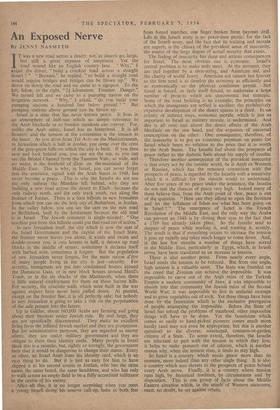I T was a new road across a desert; not as
deserts go, large, but still a great expanse of emptiness. Yet the road wound like an English country lane. " Why," I asked the driver, " build a crooked road across a straight desert ? " " Because," he replied, " to build a straight road . would require bridges and bridges can be blown up." We drove on down the road and we came to a signpost. To the left, Sdom; to the right, " 2i kilometres. Frontier. Danger." We turned left and we came to a pumping station on the irrigation network. " Why," I asked, " do you build your pumping stations a hundred feet below ground ? " But pumping stations above ground can be blown up. from forced marches, one finger broken from bayonet drill. Life in the Israeli army is no peace-time picnic; for the fact of the Israeli army, and the fact that its training and "morale are superb, is the climax of the prevalent sense of insecurity, the source of the large degree of actual security that exists.
The feeling of insecurity has deep and serious consequences for Israel. The most obvious one is economic. Israel's central problem is to make ends meet. At the moment, they are tied together by a shoe-string, and American aid, and the charity of world Jewry. American aid cannot last forever so the first need is to develop the economy as efficiently and as economically as the physical conditions permit. But Israel is forced, or feels itself forced, to undertake a large number of projects which are uneconomic but strategic. Some of the road building is an example; the principles on which the immigrants are settled is another; the prohibitively expensive development of the desert spaces is a third. In an infinity of indirect ways, economic morale, which is just as important to Israel as military morale, is undermined. And this is all over- and above the direct effects of the Arab blockade on the one hand, and the expenses of universal conscription on the other. One consequence, therefore, of the insecurity is to put an economic premium on peace for Israel which bears no relation to the price that it is worth to the Arab States. The Israelis feel about the prospects of peace rather as the diabetic feels about his supply of insulin.
• Therefore another consequence of the -prevalent insecurity is that every act by the outside world, be it Arab or Western, or Russian, which has the remotest connection with the prospects of peace, is regarded by the Israelis with a- sensitivity which it is difficult for the outside world to understand. After five years of no peace 'under the armistice, the Israelis do not rate the chances of peace very high. Indeed many of them believe that, from the Arab point of view, peace is out of the question. " How can they afford to open the frontiers and let the fellaheen of Islam see what has been going on in Israel ? " The emergence of Israel is the French Revolution of the Middle East, and the only way the Arabs can prevent an 1848 is, by closing their eyes to the fact that a 1789 has already taken place. So the Israelis tend to despair of peace while needing it, and wanting it, acutely. The result is that if something occurs to increase the tension it goes up rapidly and takes much longer to come down. And, in the last few months a number of things have stirred in the Middle East, particularly in Egypt, which, in Israeli terms, have been translated as an increase in tension.
There is also another point. From nearly every angle, Israel needs the tension to be reduced. But from one angle, high tension is a valuable asset. The State was founded on the creed that Zionism can achieve the impossible. It was impossible to carve out of the Arab ruins of the Turkish Empire a modern community of Jews; it was impossible to absorb into that community the Jewish ruins of the Second World War; it was impossible to live in malarial swamps and to grow vegetables out of rock. Yet these things have been done by -.the fanaticism which is the exclusive prerogative of people attempting the impossible. Before the State of Israel has solved the problems of statehood, other impossible things will have to be done. Yet the fanaticism which comes so easily to hand-picked pioneers comes much more hardly (and may not even be appropriate, but this is another question) to the diverse, unselected, common-or-garden citizens of a State. To some extent, therefore, the Israelis are reluctant to part with the tension in which they live; it helps to make pioneers out of citizens, which is another reason why, when the tension rises, it tends to stay high.


































 Previous page
Previous page